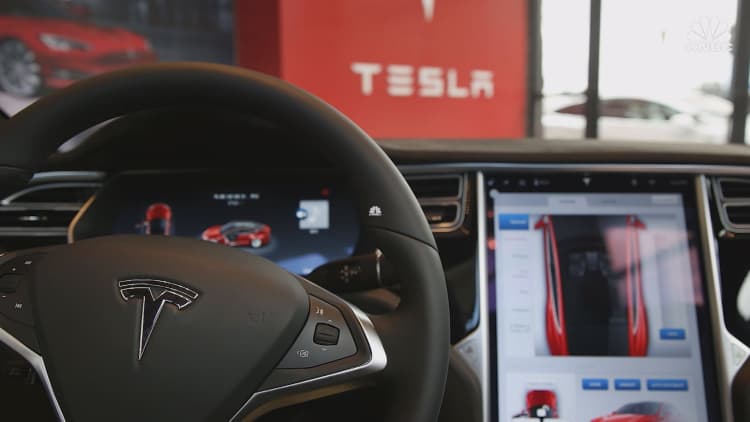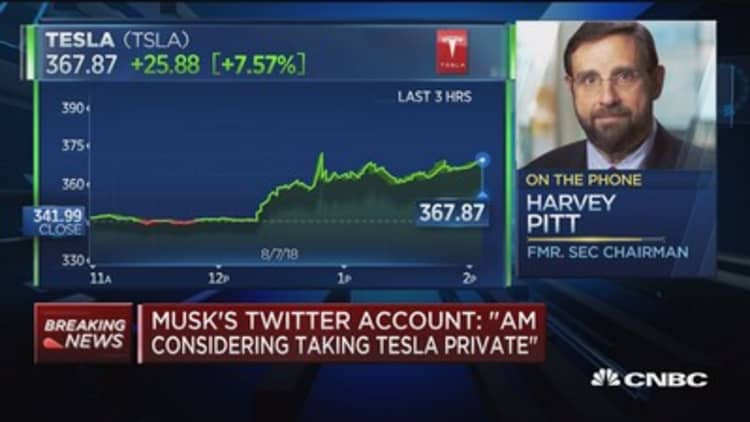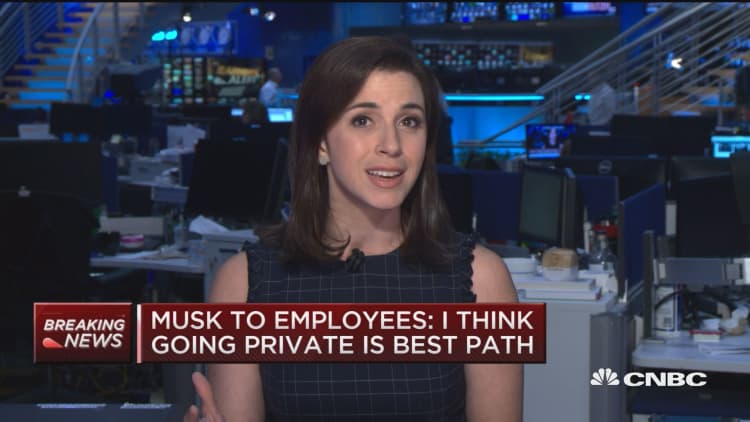
Tesla shares went on a wild ride Tuesday after CEO Elon Musk said on Twitter that he was hoping to privatize the company at $420 a share. At that price, the market value of Tesla would be about $71 billion.
Initially, it wasn't clear if the CEO's proclamation was in jest — "420" is a popular code endorsing cannabis consumption. But Musk was dead serious.
In fact, Musk has signaled his wish to privatize the electric vehicle maker before. For example, he told Rolling Stone in November 2017, "It actually makes us less efficient to be a public company." But Musk delivered his informal proposal on Tuesday seemingly out of the blue.
By Tuesday afternoon, Musk made a more formal statement about privatizing Tesla in a company blog post.
There are several reasons why Musk might want to go private:
Keep competitive information secret: As a privately held company, Tesla would not have to disclose information that could give competitors an edge.
By contrast, Tesla now makes quarterly disclosures about debt levels, personnel changes, executive compensation, how many cars are being produced and delivered, various lawsuits the company is facing, recent personnel changes, and its views of risks and competitors.
Align with long-term shareholder interests: As Musk alluded to in his letter, owners of privately-held companies can maintain control over every operational decision without running afoul of shareholders' quarterly expectations.
He wrote that being public "puts enormous pressure on Tesla to make decisions that may be right for a given quarter, but not necessarily right for the long-term."
Loup Ventures' Gene Munster gave CNBC similar reasons why Tesla might want to be private:
"The benefits of being private are even more clear for Tesla, considering their ambitious mission. They want to accelerate the globe's adoption of renewable energy. Companies with a big mission like this are typically held back by managing for quarterly investor expectations.
This last quarter for Tesla is a great example — the amount of energy that they put into hitting a 5,000 Model 3 production target was disproportional to the reward that they got. The stock didn't do anything. The company would have been better off if they wold have stepped production down near-term and perfected their manufacturing. Don't worry about units per week today, but build a factory so it is best equipped to build for the future."

Stock price. Musk may also have guessed that the announcement was going to bump the stock price, as one-time SEC chair Harvey Pitt hinted to CNBC Breaking News on Tuesday:
"Musk has complained about the market price, complained about shorts and got a quick bump of 5 to 8 percent on the price of the stock. If his comments were issued for the purpose of moving the price of the stock that could be manipulation. It could also be securities fraud. The use of a specific price for a potential going private transaction is highly unprecedented and therefore raises significant questions about what his intent was."
Tesla's stock price rose about 8 percent following Musk's tweets, building on a smaller rise on news earlier in the day that Saudi Arabia's sovereign wealth fund sought an equity stake in the electric vehicle make. The stock closed up 11 percent on the day.
With its stock price elevated above the $360 level, Tesla is now able to pay off some $900 million in obligations in stock instead of in cash.
Could it happen?
Musk owns around 20 percent of Tesla already. He would need to raise more than $50 billion to buy out other shareholders. Adding in around $10 billion in debt, such a deal would represent the largest leveraged buyout in history, surpassing the $45 billion acquisition of the Texas energy giant TXU (Energy Future Holdings) in 2007, which eventually went bankrupt.
Although Musk mentioned funding in his initial tweet, a blog post from Tesla did not include any mention of financing. CNBC also contacted a number of Wall Street banks and none of them was aware of any transaction or had committed to funding a leveraged buyout of Tesla.
Overall, Munster guesses that Tesla has a one in three chance of pulling off privatization at $420 per share. He said:
"It could be hard to incentivize the believers to give up their Tesla stock. Many of the public investors cannot invest in a private company, and would be forced to sell. I think a lot of them will not want this, at this time, and not for a 16 percent premium. That's just not enough."
WATCH: Musk sends Wall Street into a frenzy with one tweet



